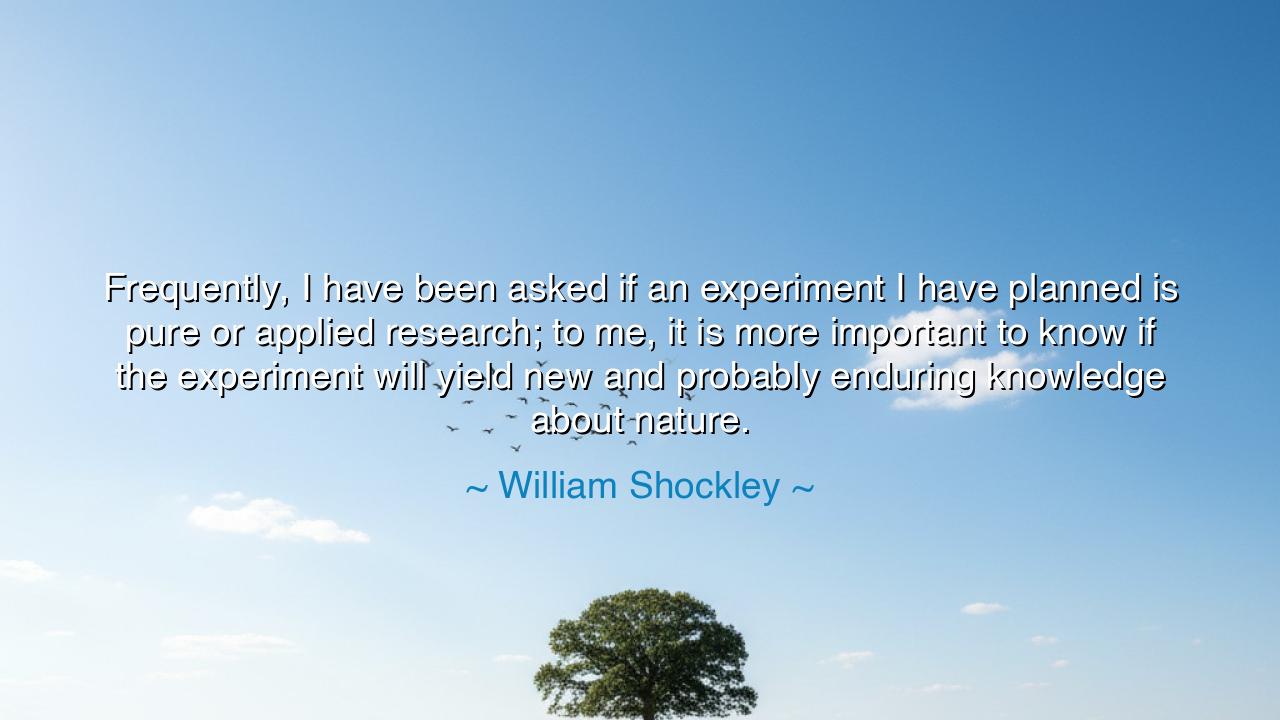
Frequently, I have been asked if an experiment I have planned is
Frequently, I have been asked if an experiment I have planned is pure or applied research; to me, it is more important to know if the experiment will yield new and probably enduring knowledge about nature.






"Frequently, I have been asked if an experiment I have planned is pure or applied research; to me, it is more important to know if the experiment will yield new and probably enduring knowledge about nature." Thus spoke William Shockley, one of the great minds behind the transistor, whose discoveries reshaped the world and ushered in the age of electronics. His words pierce through the petty divisions of classification and reach toward the eternal question: does the work we do reveal truth about the world, and will that truth endure beyond the fleeting hour? For to him, the heart of inquiry was not whether a study was “pure” or “applied,” but whether it bore the fruit of knowledge that could illuminate nature’s mysteries.
The meaning of this wisdom is profound. Men often divide their labors into categories—this is pure research, done for curiosity alone; that is applied research, done for practical ends. Yet Shockley reminds us that these distinctions are but garments we place upon the same body. What truly matters is whether the experiment reveals something enduring, whether it brings forth a new truth about the natural world. For truths about nature are timeless; they remain whether men use them for industry, for invention, or simply for wonder.
History bears witness to this law. When Michael Faraday studied the mysterious forces of electricity and magnetism, many saw his work as pure curiosity, without immediate use. Yet from his coils and sparks arose the very foundations of the modern power grid. Likewise, when Gregor Mendel tended his peas in silence, his genetic patterns seemed but the idle musings of a cloistered monk. Yet his truths became the seed of modern biology. In both cases, it was not the label of the research that mattered, but the enduring knowledge that it uncovered.
Shockley himself embodied this union. In the laboratories of Bell, his investigations into semiconductors seemed at times abstract, even esoteric. But from those experiments was born the transistor, the tiny device that now lives at the heart of every computer, phone, and machine of the modern world. What began as exploration of nature’s mysteries became the foundation of an empire of technology. Here we see the heroic truth of his words: that to pursue knowledge of nature is to plant seeds whose fruit may feed generations yet unborn.
This teaching is also a rebuke to short-sightedness. Too often, men ask: "What profit will this bring me today? What application will this have tomorrow?" In their impatience, they fail to see that the deepest discoveries often begin without clear use. If judged only by utility, many of the greatest breakthroughs would never have been pursued. Shockley calls us instead to ask the higher question: "Will this reveal something true, something enduring, something that will deepen humanity’s grasp of the universe?" For such knowledge, once gained, will find its use in ways beyond imagination.
The lesson for us is clear: in your pursuits, do not be bound by narrow categories or impatient demands. Whether you labor in science, art, or philosophy, seek the work that brings forth enduring truth. If your path is labeled impractical, let it not deter you, for what seems impractical today may be indispensable tomorrow. If your work seems abstract, remember that the universe itself is woven from abstract laws that govern the concrete world. Seek not only immediate gain, but lasting knowledge.
Practical action follows. Cultivate curiosity for its own sake, but also discipline in testing what you find. Ask always: "Does this expand my understanding of nature, of humanity, of the world?" Do not let others dismiss your work by confining it to the boxes of “pure” or “applied.” Instead, strive to reveal truths that endure, for these are the treasures that time cannot erode. And if you are a leader, nurture those who dare to explore, for their discoveries may be the pillars upon which future civilizations are built.
So I say to you, children of tomorrow: remember the wisdom of William Shockley. Categories may fade, usefulness may shift, but truth endures. Seek experiments, seek endeavors, that reveal the deep order of creation. For in uncovering the knowledge of nature, you join the chorus of seekers across the ages, and your work becomes not a passing flame, but a torch carried forward into eternity.






AAdministratorAdministrator
Welcome, honored guests. Please leave a comment, we will respond soon